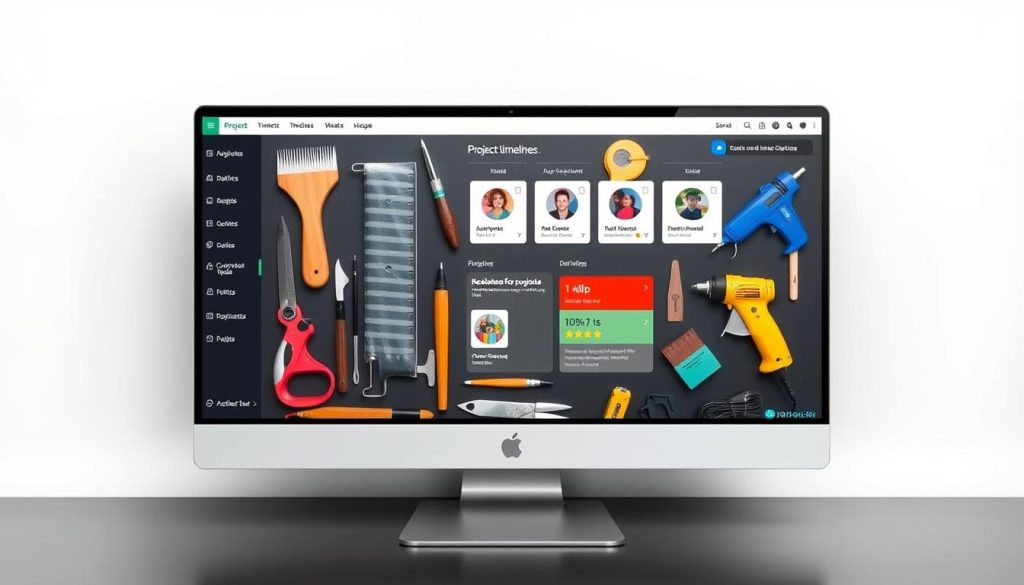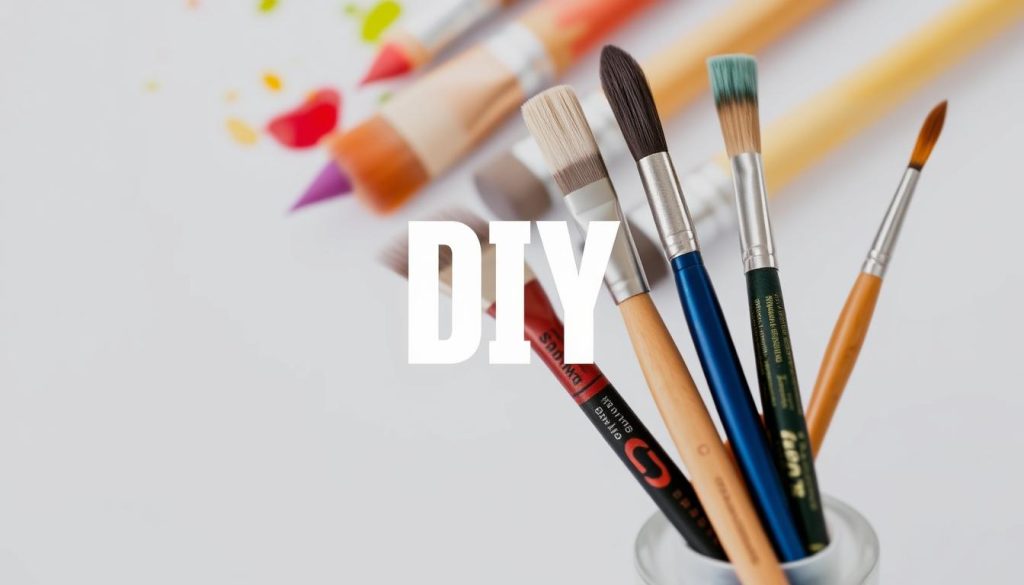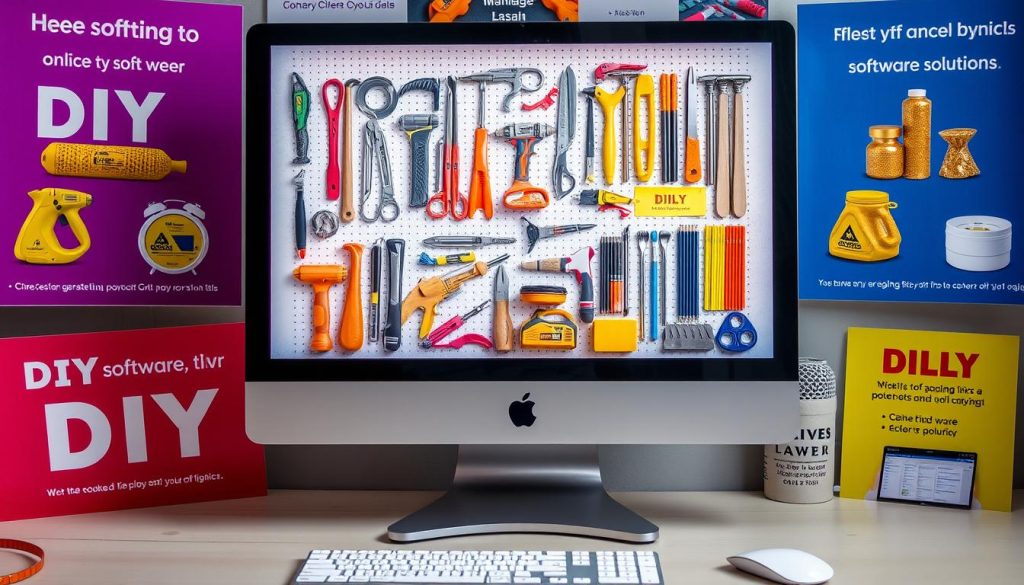Software developers are targeting the DIY enthusiast market for strategic growth. These tech-savvy individuals seek innovative tools to enhance their projects. Capturing this audience can boost sales, brand awareness, and customer loyalty.
This guide explores strategies to promote software to DIY enthusiasts effectively. We’ll cover understanding their needs and crafting tailored marketing approaches. You’ll learn how to position your software as essential for DIY projects.
Key Takeaways
- Understand the unique needs and preferences of DIY enthusiasts to develop software that caters to their specific requirements.
- Leverage content marketing, social media, and influencer collaborations to reach and engage your target audience.
- Optimize your email marketing campaigns and paid advertising strategies to effectively promote your DIY software solutions.
- Continuously analyze and refine your promotion efforts to maximize the impact and ensure long-term success.
- Embrace a customer-centric approach and foster a strong community around your DIY software to build brand loyalty.
Understanding Your Target Audience: DIY Enthusiasts
DIY enthusiasts love creating, tinkering, and solving problems independently. They seek custom solutions that match their specific needs. Understanding their preferences is key to promoting your software effectively.
Identifying Their Needs and Pain Points
DIY enthusiasts value flexibility and control in their projects. They often struggle to find user-friendly software that meets their needs. Many face challenges with limited functionality or difficulty integrating different tools.
By addressing these issues, you can create software that truly speaks to your audience. Your solution should offer customization options and seamless tool integration.
Exploring DIY Communities and Platforms
DIY enthusiasts gather in online communities to share knowledge and discover new products. Platforms like Reddit, YouTube, and specialized forums are goldmines of information.
Engage with these communities to understand their conversations and preferences. This insight will help you craft a more effective marketing strategy.
By grasping DIY consumer behavior, DIY enthusiast preferences, and DIY software user needs, you can develop tailored solutions. Use DIY community research and DIY platforms and channels to promote your software effectively.
“DIY enthusiasts crave accomplishment and uniqueness in their creations. Understanding their motivations is crucial for developing software that truly resonates with them.”
Crafting a Compelling Software Solution
Design software that caters to DIY enthusiasts’ unique needs. Understand their pain points and craft features that enhance their experience. Position your DIY-friendly software as an invaluable tool.
Features Tailored to DIY Enthusiasts
Develop intuitive DIY software features that streamline workflows. Focus on creating a user-friendly experience for DIY enthusiasts.
- Simplified interfaces with easy-to-access controls and customization options
- Automated processes to reduce manual tasks and save time
- Built-in tutorials and step-by-step guides to assist users at every stage
- Collaborative features to facilitate sharing and feedback within DIY communities
Prioritize DIY-friendly software design to empower users. Create an experience that helps them work efficiently and achieve results confidently.
Highlighting the Benefits
Clearly communicate the DIY software benefits that set your product apart. Show how your software can make a difference for DIY enthusiasts.
- Save time and effort by automating repetitive tasks
- Enhance the quality of DIY projects through precise tools and guidance
- Foster a sense of community by enabling collaboration and knowledge sharing
- Provide a seamless software user experience for DIY enthusiasts
Align your software’s value with DIY consumers’ needs and aspirations. Create a solution that truly speaks to your target audience.

Developing an Effective Marketing Strategy
A targeted marketing plan is crucial for promoting your software to DIY enthusiasts. Your strategy should focus on relevant channels and compelling messaging. It should use both digital and traditional tactics to engage your audience.
Understanding your target customers is key to your DIY software marketing strategy. Research the preferences and pain points of DIY enthusiasts. This will help you tailor your promotional tactics for DIY to resonate with them.
Immerse yourself in DIY communities and platforms. Observe the content and engagement that captures their attention. This knowledge can shape your DIY software marketing plan. It ensures your software promotion for DIY audience meets their needs.
“Successful marketing to DIY enthusiasts requires a delicate balance of technical expertise and relatable, user-centric messaging.”
Use a mix of digital and traditional marketing tactics. Create informative and visually appealing content like tutorials and guides. Collaborate with influential DIY bloggers and content creators.
Utilize social media platforms to engage with your target community. This helps you reach your DIY audience through multiple touchpoints.
An effective DIY software marketing strategy blends technical prowess with audience understanding. Craft a plan that resonates with DIY enthusiasts. This positions your software as a must-have solution for this engaged community.
Leveraging Content Marketing for DIY Software Promotion
Content marketing is a powerful tool for DIY software brands. It helps capture the attention of savvy DIY enthusiasts. By creating engaging content, brands can become trusted authorities in the DIY space.
This approach allows software companies to connect deeply with their target audience. It positions them as go-to resources for DIY enthusiasts.
Creating Engaging Tutorials and Guides
Comprehensive tutorials and guides are effective content marketing strategies for DIY software. These resources showcase your software’s capabilities and address DIY enthusiasts’ specific needs. They demonstrate how your product can improve creative processes.
From step-by-step walkthroughs to in-depth software feature explorations, these content pieces can be instrumental in driving user adoption and fostering brand loyalty.
Collaborating with Influencers and Bloggers
- Partnering with influential DIY bloggers and social media personalities can boost your software’s visibility. Their established communities can help reach your target audience effectively.
- Influencer endorsements enhance your software’s trustworthiness. Their authentic recommendations resonate with the DIY community.
- Collaborate on product reviews, tutorials, and behind-the-scenes content. This provides valuable third-party validation for your DIY audience.
Integrating content marketing for DIY software, DIY tutorial creation, and influencer marketing for DIY is key. This approach helps software brands capture the attention of DIY software bloggers and enthusiasts.

Social Media Strategies for DIY Software Promotion
Social media platforms are powerful tools for reaching DIY enthusiasts. With the right strategies, you can promote your DIY software effectively. You can also build a loyal community around your brand.
Utilizing Relevant Hashtags and Groups
Strategic hashtag use is key to social media success for DIY software. Research popular hashtags like #DIYSoftware, #DIYCreator, or #DIYTech. Use these in your posts to boost visibility among DIY software fans.
Join active DIY software communities on Facebook, Reddit, and LinkedIn. Engage with members and share valuable content. This raises awareness and helps you understand your audience’s needs better.
Team up with influential DIY software influencers and content creators. These people have strong followings in the DIY community. They can showcase your software’s features and drive traffic to your product.
Use social media, relevant hashtags, and partnerships to promote your DIY software. This approach can help you build a thriving community of eager users.
How To Promote Software To DIY Enthusiasts
Promoting software to DIY enthusiasts requires a diverse approach. Use various tactics, marketing channels, and outreach strategies to engage this unique audience. Your goal is to reach and connect with DIY enthusiasts effectively.
Create content that addresses DIY customer needs and challenges. Develop tutorials, guides, and how-to videos showcasing your software’s benefits. Team up with DIY influencers to expand your reach and build trust.
Use YouTube, Instagram, and DIY forums to connect with your audience. Join discussions, use relevant hashtags, and participate in Q&A sessions. Position your brand as a trusted resource for DIY enthusiasts.
Run targeted paid ads to reach new customers. Retarget engaged users to keep them interested. This strategy can help grow your customer base effectively.
Implement email marketing to nurture leads and inform your audience. Share product updates, special offers, and educational content. Segment your list to deliver personalized messages that resonate.
Combine these DIY software promotion tactics, DIY software marketing channels, and DIY software outreach strategies. This approach will help you engage the DIY community and build brand loyalty. You’ll drive meaningful engagement and boost conversions.

“Engaging with DIY enthusiasts on their turf and providing value-added content is the key to successful software promotion in this market.”
| DIY Software Promotion Tactics | DIY Software Marketing Channels | DIY Software Outreach Strategies |
|---|---|---|
|
|
|
Email Marketing for DIY Software Promotion
Email marketing is a powerful tool for DIY software companies. It helps connect with hobbyist audiences effectively. You can promote products, nurture leads, and boost conversions through email marketing for DIY software.
A targeted email list is crucial for successful DIY software email campaigns. Engage your DIY community and encourage website sign-ups. Use social media to attract potential customers to your mailing list.
Create compelling DIY software newsletters with valuable insights and tutorials. Address specific needs and pain points of your audience. This approach builds trust and keeps readers engaged.
| Email Marketing Tactics | Benefits for DIY Software Promotion |
|---|---|
| Welcome Campaigns | Introduce new subscribers to your DIY software and build rapport |
| Automated DIY software lead nurturing | Nurture leads with relevant content and offers, guiding them towards conversion |
| Segmented Email Lists | Tailor your messaging to specific user groups within your DIY community |
Email marketing helps you reach and engage DIY enthusiasts effectively. It’s a great way to showcase your innovative software solutions. Use it to convert interested hobbyists into loyal customers.
“Email marketing is the most cost-effective way to connect with your DIY audience and drive sales for your software.”
Leveraging Paid Advertising for DIY Software
Paid advertising can supercharge your DIY software promotion. It helps reach DIY enthusiasts, drive traffic, and boost sales. Targeted ads and remarketing campaigns are key tools in this strategy.
Targeted Ads and PPC Campaigns
PPC advertising targets your DIY software audience precisely. It uses compelling ad copies and keyword research. Your ads appear to users searching for products like yours.
This approach increases visibility and connects you with interested potential customers. It’s an effective way to reach your target market.
Remarketing and Display Ads
Remarketing tracks website visitors and shows them tailored ads on other platforms. It keeps your brand in mind and encourages revisits. Display ads on relevant websites amplify your brand’s presence.
These methods help reach new prospective customers. They’re powerful tools in your paid advertising arsenal.
Analyzing and optimizing campaigns is crucial for success. Use data-driven insights like click-through rates and conversion metrics. This helps refine your approach and maximize return on investment.
“Paid advertising is a strategic way to amplify your software’s visibility and engage your target DIY audience. By combining targeted campaigns and data-driven optimization, you can drive meaningful results for your business.” – Marketing Strategist, Jane Doe
Paid advertising complements your broader marketing efforts effectively. It ensures your DIY software gets noticed. Use these tactics to accelerate your software’s growth and success.

Analyzing and Optimizing Your DIY Software Promotion Efforts
Regular analysis and optimization are vital for successful DIY software promotion. By monitoring and refining your strategies, you can maximize ROI and achieve sustained growth.
Tracking key performance metrics is essential for campaign optimization. Website traffic, conversion rates, and customer engagement provide valuable insights into promotional effectiveness.
Analyzing these indicators helps identify tactics that resonate with DIY enthusiasts. This data-driven approach enables informed decisions and continuous refinement of your promotion strategy.
Consider A/B testing various elements of your marketing campaigns. Compare content, messaging, and target channels to uncover the most effective tactics for engaging your audience.
Long-term success in the DIY software market requires adaptability. Regularly analyze your promotion analytics and make data-driven adjustments. This ensures your marketing efforts remain relevant and impactful.
| Key Metric | Importance for DIY Software Promotion |
|---|---|
| Website Traffic | Measures the reach and visibility of your DIY software promotion efforts. |
| Conversion Rates | Indicates the effectiveness of your marketing strategies in driving software downloads or purchases. |
| Customer Engagement | Provides insights into how DIY enthusiasts are interacting with your software and marketing content. |
| Customer Retention | Highlights the long-term viability of your DIY software promotion strategies. |
“Continuous analysis and optimization are the keys to maximizing the ROI of your DIY software promotion efforts.”
Use DIY software promotion analytics to make data-driven decisions. This approach helps refine marketing strategies and improve campaign performance. Ultimately, it drives sustainable growth in the DIY software market.
Conclusion
Promoting software to DIY enthusiasts requires a tailored, data-driven approach. Understanding your audience’s needs is crucial. Craft a compelling solution and use diverse marketing strategies to position your software effectively.
Focus on developing user-friendly DIY software with rich features. Implement content creation, social media engagement, and strategic advertising. These steps will boost awareness and sales for your DIY software offerings.
Continuously analyze and optimize your DIY software promotion strategies. Stay responsive to your audience’s changing needs. Deliver exceptional value to make your software indispensable to DIY enthusiasts.




